Carrier-independent, low-power emergency phone
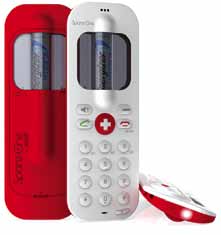
SpareOne is an emergency communication device that ensures you remain connected even in the worst situations. It works with a single AA-size battery and has 15 years of battery life when stored unused, or 10 hours of talk time when in use. It has a durable torch light, dedicated emergency number calling buttons, and a weather-proof package.
Debuted at CES, SpareOnePlus includes a location-based service to identify the exact location of the cell ID—accessible through a free smart-phone app—as well as audible numeric feedback which reads dialled numbers and incoming calls aloud. The phone can be ordered from their website and costs less than $100.
Inside: Both models are available in two GSM frequencies to enable use across the world: 850/1900 MHz and 900/1800 MHz. SpareOne is SIM unlocked, so it can accept SIM cards of any GSM operator. Micro-SIM adaptors are also available to insert iOS SIM cards. So you can insert practically any SIM with credit and start making calls at local rates. Other benefitsinclude a light-emitting diode torch, low power consump-tion, and a talk-through, resealable waterproof bag with humidity-proof seal.
Doctor in your pocket
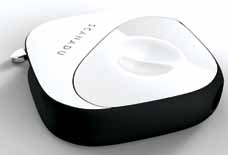
Scanadu, a company based at the NASA-Ames Research Center, has developed a home diagnostic tool called SCOUT to study the vital signs that refect your health condition. Just hold SCOUT to the temple. In less than ten seconds it reads more than five vital signs and transmits the information to a mobile applcation, which instantly calculates the pulse transit time, heart rate, electrical heart activity, temperature, heart rate variability and blood oxygenation. This information can be shared with a doctor, or stored and studied over time to figure out how healthy you are.
At CES 2013, Scanadu also unveiled ScanaFlo that does urine-based tests, and ScanaFlu that detects upper respiratory tract infections using a saliva sample. These are also integrated with a mobile app. All three devices will be launched later this year, at a price less than $150.
Inside: All three devices use body sensors, molecular diagnostics, imaging and sound analysis, data analytics and a suite of algorithms to study and offer a comprehensive, real-time picture of your health data. They fit the escription of a ‘tricorder.’ The software platform is extensible and can be opened up to input from other tracking and monitoring devices.
More power from your car’s cigarette lighter
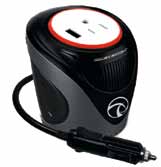
The XC180 is claimed to be the world’s smallest cup inverter that can convert 12V DC power into 180W AC. It plugs into your vehicle’s cigarette lighter, fitssecurely in a cup holder, and outputs enough power for four devices—a 120V AC outlet for laptops, DVD players, etc and three USB ports that can charge electronic devices including iPad. Its 5V DC, 2.1A USB ports are capable of charging four times faster than standard USB.
Inside: The 12V modified inewave cup inverter features a 7.9×7.9cm2 (3.1×3.1-inch2) footprint and a noiseless technology that uses an ultra-silent thermal fan. It has three USB ports and an AC outlet. It takes 10-15.5V input and outputs 110-120V in 60MHz frequency range. It is protected against overload and short circuit, and comes with cigarette lighter and battery clip cables.
A secure device to store your passwords
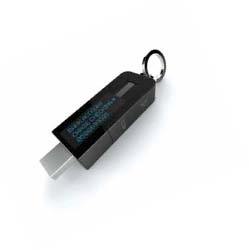
Passwords are so difficultto manage, and nowadays everything needs a pass-word. You need to remember dozens of passwords, they all have to be dissimi-lar, you have to keep changing them frequently, and you cannot even write them down! If this dilemma sounds familiar, then myIDkey is sure to catch your attention.
myIDkey is a voice-activated, fingerprint-authenticatedUSB drive that stores passwords, email IDs, numbers and such personal information and displays it on its built-in screen. It is a handy and secure tool, which will be launched this year and is likely to cost around US$ 120.
Inside: myIDkey features voice search, secure 16GB storage, a Cloud-based password management platform, auto deletion of information on multiple wrong accesses, recessed high-contrast organic LED screen, Atmel microcontroller with high-performance ARM Cortex-M3 32-bit RISC core operating at up to 96 MHz, fingerprintauthentication using a digital signal processing controller with Authentec’s AES1711 biometric fingerrint reader and their patented TruePrint and TrueMatch technologies, and data security with military-grade AES 256 encryption.
Fostering innovation with cloud-based interactive learning
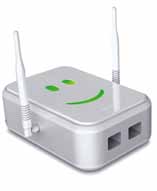
This easy-to-use, low-power cloud computer claims to turn a normal class into a connected, secure and highly interactive learning environment by setting up a micro-cloud for up to 60 students. It facilitates the delivery of educational content and applications via a range of mobile devices including smart phones and tablets.






